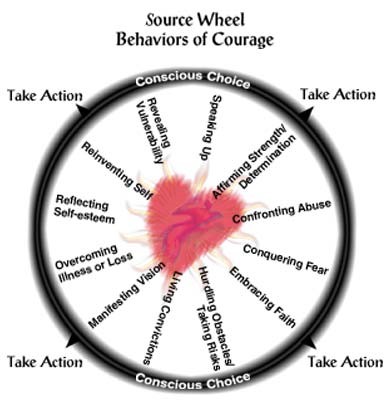“Courage is the first of human virtues because it makes the other virtues possible.” (Aristotle)
As I’ve been exploring kindness this year, I’ve been struck many times by the fact that it often takes courage to be kind. Extending kindness to others—and even to ourselves—risks judgment, rejection, or going against prevailing winds. Sometimes it means we make ourselves vulnerable or chance looking foolish. Courage is required if we are to overcome all of those risks. As Wayne Muller said, “A kind life…is fundamentally a life of courage.”
I know of no one more qualified to talk about courage than my friend and colleague Sandra Ford Walston. Sandra is a speaker and internationally known as The Courage Expert. She’s the author of several books, including Courage: The Heart and Spirit of Every Woman/Reclaiming the Forgotten Virtue, The Courage Difference at Work: A Unique Success Guide for Women, and Face It! 12 Courageous Actions that Bring Success at Work and Beyond. Sandra is a human potential consultant, speaker, trainer, and courage coach. She has graciously agreed to be interviewed and to share her wisdom about courage with A Year of Living Kindly.
YOLK: Sandra, the kind of courage you write and speak about isn’t the daring of jumping out of a plane, or running into a burning building, or even the bravery of facing a life-threatening illness. How would you describe the courage that you’ve researched, written and spoken about for so many years?
Sandra Ford Walston: Traditionally, courage is viewed as withstanding danger or facing fear under perilous circumstances. Such acts as running into a burning building, pushing a pedestrian out of the way of a speeding car, tackling a robber in flight, or a soldier throwing himself on a grenade to save his squad are readily accepted instances of courage. But split-second heroism and everyday courage are not one and the same. What I am suggesting is that everyday people like you and me display courage constantly and subtly. Courage is much more complex than spontaneous reactions to traumatic events. We “everyday people” can embrace our courage and pass it on to others. We do it by inviting the original definition of courage into our lives.
YOLK: What is that original definition?
SFW: Courage originates from the Old French corage, meaning “heart and spirit.” This takes us beyond the narrow definition of bravery in the face of danger to encompass mental or moral strength. When I apply this original definition to my life, I feel more empowered to be discerning and better able to respond to my inherent energy of courage. The word “virtue” in Latin is virs, meaning “energy.” Some people who have trouble claiming their courage might find it easier if they think of courage as energy—as their life energy.
Paradoxically, hiding my courage drains my energy. By paying attention, I know when my reservoir of courage is low or brimming over. My reservoir is full when I turn down a piece of business because it doesn’t feel like the right fit. I also know when I swallow my voice or sell my soul that my courage is low. When I constantly ask, “Am I being true to who I am?” I know I am applying the original definition to my life. I have the dignity to dare.
YOLK: What are some other examples of “everyday courage”?
SFW: Sometimes small acts require great courage. We see it in the workplace when one has the courage to ask for the long overdue raise, or take the risk to leave a job without another in place, or confront a workplace bully. Elsewhere in our lives, one may demonstrate courage when summoning the strength to get a divorce or end a relationship, or the conviction to get married or enter a relationship. For women, especially, learning to ask for what you want is often an act of courage.
YOLK: You write a lot about courage related to women and girls. How is courage different for males and females?
SFW: While I haven’t conducted research on courage gender differences, we know that gender colors behavior, perception and perspectives. I have researched and discovered that throughout history, women have generally acted from their hearts, thus male notions of courage as heroic actions tended to diminish recognition of feminine courage. Perhaps women have been unconscious to the truth that they have always been courageous. Discovering courage awakens an ancient feminine energy that every woman should utilize.
When women exhibit courage in the workplace, such as taking a stand, speaking up, or accepting a new role or a professional risk, they tap into that valuable personal reserve called courage. Courageous women step up to the next level. And they design their own professional path rather than letting outside influences dictate who they are or what they should be.
I encourage women to ask themselves, “Are you a profile in courage at work?” Most of us probably don’t think of ourselves in that way. Going back to that original definition of the word, courage is the awareness of the heart. The heart has an unlimited capacity to hold all that we are to be.
YOLK: I like that. It sounds like mindfulness is an essential element of courage, just as I believe it is of kindness. We need to continually be mindful and pay attention to our lives. It’s so easy to miss the opportunities to be courageous, as well as to recognize when we have acted courageously. I see it with kindness, too: it’s easy to miss opportunities to extend kindness if we walk around in a state of obliviousness.
SFW: Yes! We claim our courage when we come to understand and practice the art of being present. Present to our actions, present to our experience, and present to our emotions. As a result of learning to live wholly in the moment and having the courage to stop and reflect, we are able to process choices clearly and quickly, take action more readily, and stay centered in our own truth.
YOLK: I loved a line I read in a recent blog post of yours: “Courageous women recognize defining moments as they happen.” That certainly reinforces the need for mindfulness, but there’s more to it. What did you mean by that statement?
SFW: How often do we see a red flag but do nothing to change the situation it is warning us about? Sometimes we see 50 red flags before we finally act. Staying centered in our courage allows us to see these defining moments and respond to the first warning sign, rather than deny it or deceive ourselves. Another instance of recognizing and seizing a defining moment is a woman I spoke to just a few days ago. She told me that she had interviewed for a job and for the first time ever in such a situation she chose to affirm her strength and her self-esteem and she asked for everything she wanted from the potential employer. Not only did she get the job, she got everything she asked for. Women don’t do that often enough; we allow misplaced fears to hold us back. Fear is often the chatter of learned responses and it keeps us from speaking up or recognizing that something isn’t right. As we are more aware of that, we conquer it.
YOLK: You describe twelve behaviors of courage. Do you think that any of them are particularly essential for leading a kind life?
SFW: Through my research, I’ve identified twelve behaviors of courage, which are shown on the Source Wheel. People I coach and speak with often exhibit many of these behaviors and see a need to strengthen others. In different situations, we call on different energies of our courage for the strength to stand up for ourselves and remain true to our self. Any of these energies may be summoned to express kindness.
My conversation with Sandra was so rich—we could have talked all day! Rather than try to condense it, I’ve divided it in two parts. I’ll post part 2 next week. In the meantime, take some time to think about where courage shows up in your life … and perhaps where it doesn’t. Proudly claim the courage that is yours and yours alone. I invite you to use the comments section below if you’re willing to share a story of your courage.
“Everyday courage has few witnesses. It is no less noble because no drum beats and no crowds shout your name.” (Robert Louis Stevenson)



Thank you both for this outstanding interview.
it felt as though every portion resonated for me. I especially loved the idea of having “the dignity to dare.”
Brilliant and brave piece!
With much gratitude,
Allison
LikeLiked by 1 person
Thank you, courageous and kind Allison, for such a lovely comment. I’m so glad it resonated for you. Yes, “dignity to dare” was something Sandra said that really touched me, too. It speaks of claiming our courage and wearing it proudly!
LikeLike
Donna, thank you for this introduction to the ideas of Sandra Ford Walston. I see much here to agree with, but even more exciting, many points I had not thought of and am now eager to further reflect upon! I especially love Walston’s ideas on courage and women! May I reblog this post?
LikeLiked by 1 person
Nancy, thank you for your kind comment. I’m so glad that Sandra’s views about courage were exciting to you. And, yes! By all means, you may reblog the post … I’d be honored! Thank you so much.
LikeLike
Thanks to you, Donna and Sandra, for sharing this rich conversation. Looking forward to Part Two!
LikeLike
Thanks, Kris,so glad you enjoyed our conversation. I’m eager to share part 2!
LikeLike
Reblogged this on Practically Wise and commented:
Donna Cameron interviews Sandra Ford Walston, an author and speaker, on what everyday courage means, particularly for women in the workplace. I find this very timely as I start a new job tomorrow. Thank you, Donna!
LikeLiked by 1 person
Donna, I reblogged this added my comment: “Donna Cameron interviews Sandra Ford Walston, an author and speaker, on what everyday courage means, particularly for women in the workplace. I find this very timely as I start a new job tomorrow. Thank you, Donna!” 🙂
LikeLike
Thanks so much, Nancy! I love the look and content of Practically Wise (tried to make a live link to it, but couldn’t figure it out…readers, click the link in Nancy’s message), and am honored that you chose to share it. Best of luck on your first day of the new job!
LikeLiked by 1 person
Pingback: Kindness Requires Courage: Part 2 of an Interview with Sandra Ford Walston | A Year of Living Kindly